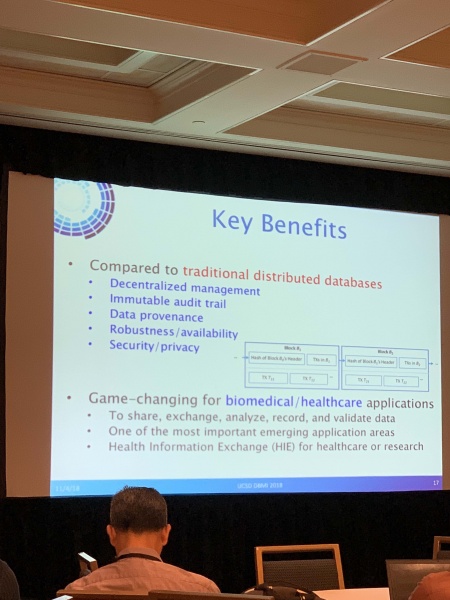
The American Medical Informatics Association (AMIA) held their annual symposium this past week in San Francisco. The group brings together researchers, clinicians, and administrators who are interested in leveraging informatics methods and tools to improve medical care and research. This year the theme was “Data, Technology, and Innovation for Better Health.”
 Blockchain Technology
Blockchain Technology
Two areas of interest to me were the sessions on the role of blockchain technology in healthcare and the impact of social determinants on health. Blockchain is most well-known as the technology that underlies cryptocurrency such as Bitcoin or Ethereum. Multiple speakers discussed applications for blockchain in healthcare including improved medical record management, enhanced insurance claim processing, advanced biomedical/healthcare data ledger, and accelerated biomedical/clinical research. (See photo to right explaining benefits of blockchain technology.)
Social Determinants of Health
The other aspect of the conference of interest to me, given my own research in this area, were the sessions on social determinants of health. A number of speakers discussed how to incorporate this information into the EHR of patients, how this information can impact risk prediction, and ways to identify neighborhoods at greatest risk for certain conditions. I suspect social determinants of health, and more broadly public health informatics, will become a larger part of future AMIA meetings. In one of the more interesting sessions unrelated to these topics, a researcher explained how something as simple as changing the name of newborns from “babyboy” or “babygirl” to the mother’s first name and boy or girl (e.g., Wendysboy) can reduce wrong-patient error by 36%.
Strong Duke Presence
As in previous years, Duke had a strong presence at the meeting. Of note, two Duke faculty members – Lesley Curtis and Warren Kibbe – were recognized for their contributions to the field by becoming Fellows of the American College of Medical Informatics. A number of Duke researchers participated in sessions, presented abstracts in oral or poster form, or moderated posters sessions.
"This was my first time attending the annual meeting and it did not disappoint."
This was my first time attending the annual meeting and it did not disappoint. It was a great way to get feedback on one’s research, network with future collaborators, and learn about cutting edge research in the field. I look forward to attending the more intimate AMIA Clinical Informatics meeting this coming March where I will be presenting some of my work on how neighborhoods impact health. Hope to see you all there.